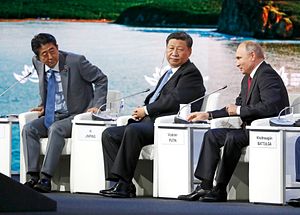Speaking at the fourth iteration of the Eastern Economic Forum in Vladivostok on September 12, Russian President Vladimir Putin offered Japan a peace treaty more than 73 years after the Soviet Union declared war on Japan in August 1945.
Addressing Japanese Prime Minister Shinzo Abe, who sat along Putin during a plenary session, the Russian president took the audience and Japan’s head of government by surprise when he said: “So here’s the idea I came up with — let’s conclude a peace treaty not now, but before the end of the year without any preconditions.” Later he added: “I was not joking.”
Abe did not respond to the peace offer on stage.
The Russian president’s proposal was preceded by short remarks by the Japanese prime minister. “Our relations with Russia hold unlimited potential,” Abe said. “Over the long stretch of more than 70 years since the end of World War II, Japan and Russia have yet to conclude a peace treaty between them. Both Putin and I agreed this is an abnormal state of affairs.”
Later that day, Japan issued a statement saying that it would reject Russia’s proposal. “[T]here is absolutely no change to our country’s perspective of resolving the problem of rights over the Northern Territories before sealing a peace treaty,” Japanese Chief Cabinet Secretary Yoshihide Suga said in a September 12 statement.
In calling for a peace treaty to be signed immediately and without preconditions, Putin effectively urged Japan to give up its claims on the disputed Kuril Islands or Northern territories – known in Japanese as the Shikotan, Kunashiri, Etorofu and the Habomai islets – located in the Sea of Okhotsk in the Northwest Pacific, seized by the Soviet Union in August 1945 at the end of World War 2.
“By 1949 the Russians had expelled all 17,000 Japanese residents of the islands,“ I explained elsewhere. “Under the 1951 San Francisco Peace Treaty, Tokyo renounced ‘all right, title and claim to the Kuril Islands’; however, Moscow never signed the peace treaty and Tokyo refused to concede that the four disputed islands were in fact part of the Kuril chain.”
Consequently, Abe had no choice but to reject the proposal. Japan still considers the islands to be part of its sovereign territory. The Soviet Union and Japan restored “peace, friendship and good-neighborly relations,” in the Soviet-Japanese Joint Declaration of 1956. Discussions regarding a peace treaty and a final settlement of the territorial dispute have been part of bilateral discussions for many decades. Abe and Putin alone already met 22 times to discuss sovereignty status of the Kuril Islands.
Notably, Japan has also repeatedly rejected Russia’s offer to settle the dispute with the return of the two smallest territories of the chain, Habomai and Shikotan.
There is no reason to believe that Russia is interested in changing the current status-quo with de facto Russian control of the islands. Rather, Putin is interested in deepening economic and political ties with Japan (while at the same time undermining the U.S.-Japan alliance) and is tactically using the island dispute to create incentives for the Japanese government to keep engaging with Russia as Tokyo knows that an eventual return of the territories is dependent on Russian goodwill.
Moscow in recent years has again slowly been expanding its military presence there. In July, Japan asked Russia to reduce its military activities on the disputed island chain.

































